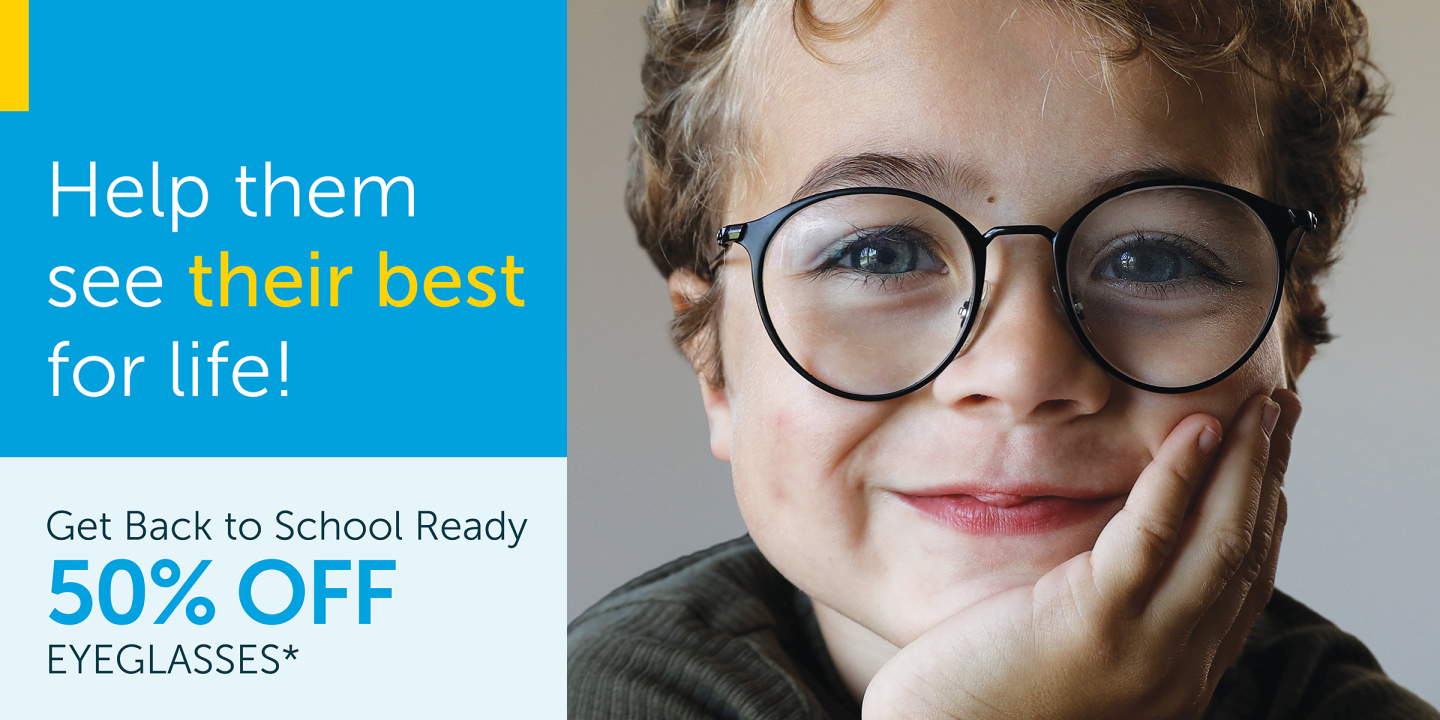Buy one pair of eyeglasses, get a second pair 50% off!
*Restrictions apply. Click here for details.
Why You Need UV Eye Protection

We often take our eyes for granted because we’re always using them. We need to treat our eyes with the utmost care because they can be damaged in various ways. Excessive exposure to ultraviolet (UV) radiation stands as one of the most prevalent causes of eye damage. No matter what the sky looks like or what the weather conditions are, UV rays can still reach our eyes and cause harm.
The EyeDoctors Optometrists team in Kansas wants to celebrate UV Safety Awareness Month this July by raising awareness of the harmful effects of UV exposure and the importance of UV eye protection. Our goal is to get you thinking about the health of your eyes while you’re outside soaking up the sun this summer.
Why Sunglasses Are Important
Dr. Justin Gillette discusses the importance of polarized sunglasses and what to look for to ensure they protect your eyes from harmful UV rays.
What are UV Rays?
UV radiation, or UV rays, is a type of electromagnetic radiation that can come from artificial sources and the sun. UVA, UVB, and UVC are three types of UV rays. With that being said, only UVA and UVB rays actually reach the surface of the Earth. If we’re not careful, UVA and UVB rays can severely damage our eyes. UV rays aren’t all scary. They help with the production of Vitamin D, which all humans need for better health. Excessive exposure to UV radiation can result in sunburns and even give rise to grave health conditions like cancer. Properly protecting your eyes is one the most important things we can do to maintain our health.
What Can UV Rays Do to Your Eyes?
Several eye conditions can result from extended and unprotected exposure to UV rays:
Photokeratitis
Photokeratitis is a sunburn of the eyes. It is caused by prolonged exposure to intense UV rays. Photokeratitis symptoms can include severe pain, eye redness, excessive watering, tearing, blurred vision, and an uncomfortable sensation in the eyes. Photokeratitis is temporary but can cause long-term damage if it occurs numerous times.
Pterygia
A pterygium can develop with prolonged exposure to UV radiation. A pterygium is a growth of tissue on the white of the eye. It can cause discomfort, redness, and even astigmatism if the pterygium grows large and interferes with your vision.
Cataracts
If your eyes are frequently exposed to UV rays, cataracts can develop more quickly. Cataracts cloud your eyes and can impair your vision. You can eventually become blind if your cataracts aren’t properly treated. If you take too long to seek treatment, you will likely need surgery to remove the cataracts.
Macular Degeneration
Age-related macular degeneration (AMD) is a condition that primarily affects the central area of the retina, resulting in vision problems such as blurred or distorted vision. Severe cases of AMD can even lead to irreversible vision loss and blindness. Research suggests that UV radiation is closely associated with an increased risk of developing AMD. AMD is a common eye condition, particularly among individuals aged 50 years or older. It is a leading cause of vision loss. There are steps you can take to prevent AMD from developing. By adopting proper eye protection practices, you can effectively reduce the rate at which AMD progresses.
Good Eye Protection is Key
Proper UV protection will go a long way in keeping your eyes healthy.
UV Exposure is Cumulative
To minimize the risk of developing eye problems later in life, it is crucial to understand that UV radiation damage accumulates over time. It is crucial to protect your eyes from a young age. Therefore, it is essential to prioritize the eye protection of children whenever they are outdoors.
Protect Yourself Year Round
When you’re outside during the day, you’re always near UV rays no matter what. They are present year-round, even when it is cloudy outside. Make sure to wear sunglasses with proper UV eye protection all year! Don’t let cloudy skies deceive you if you’re going to be outside for extended periods.
What Sunglasses are Best for UV Protection?
It’s important that you don’t just buy stylish sunglasses. You need to make sure you buy a pair that will keep your eyes safe. You can buy glasses that protect you and look good at the same time:
UV Blocking
For sunglasses to keep your eyes safe, they need to have 100% UVA and UVB ray protection. Sunglasses you find for cheap at convenience stores most likely won’t provide the protection your eyes need.
High-Quality Lenses
You’ll want your sunglasses to provide clear vision and also protect you against harmful rays. Not only is UV ray blocking important to keep your eyes safe, but having clear vision is another important safety aspect.
Coverage and Fit
To optimize protection against UV exposure, consider searching for sunglasses that either have a wrap-around design or feature large lenses. These styles will do a good job of letting the sun’s rays get into your eyes. Additionally, it is important to ensure your sunglasses fit your face. Loose-fitting sunglasses may fall off easily or create gaps that allow sunlight to penetrate. You’ll also want to avoid glasses that are too small. If they are too small they might not fully cover your eyes.
Polarized Lenses
When it comes to preventing glare and enhancing visual clarity, especially when driving, polarized lenses are your best choice. These lenses effectively reduce glare and provide additional clarity, especially during peak sunlight and UV ray conditions.
Contact The EyeDoctors Optometrists in Kansas Today
If you’re outside a lot, it’s crucial that you take necessary eye protection precautions. The EyeDoctors Optometrists will help you get the sunglasses you need to help protect your vision. We have many locations across Kansas. No matter where you are, quality eye care and clearer vision are never far away!
Contact us to learn more about how sunglasses can provide good UV eye protection and what steps you can be taking to keep your eyes healthy. Schedule an appointment at The EyeDoctors Optometrists today! Go through our sunglasses shop to find your perfect pair!

